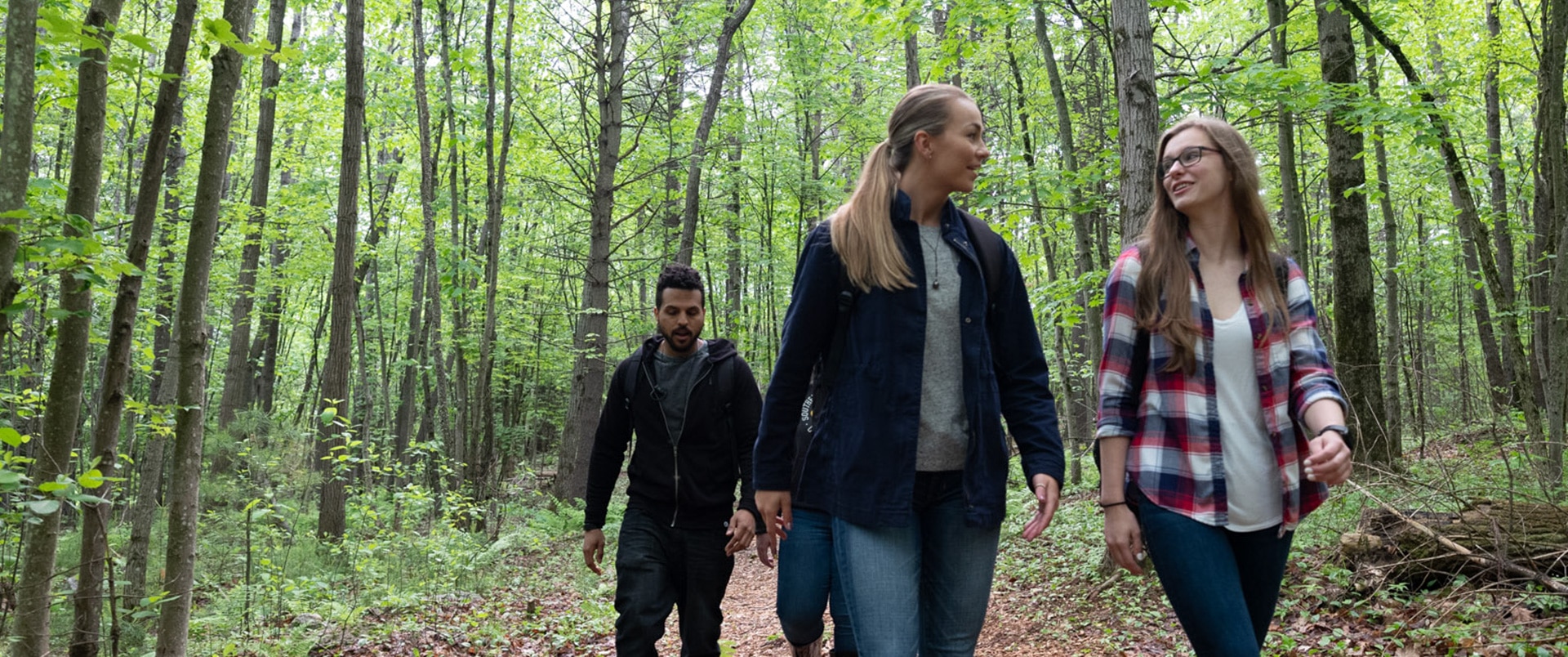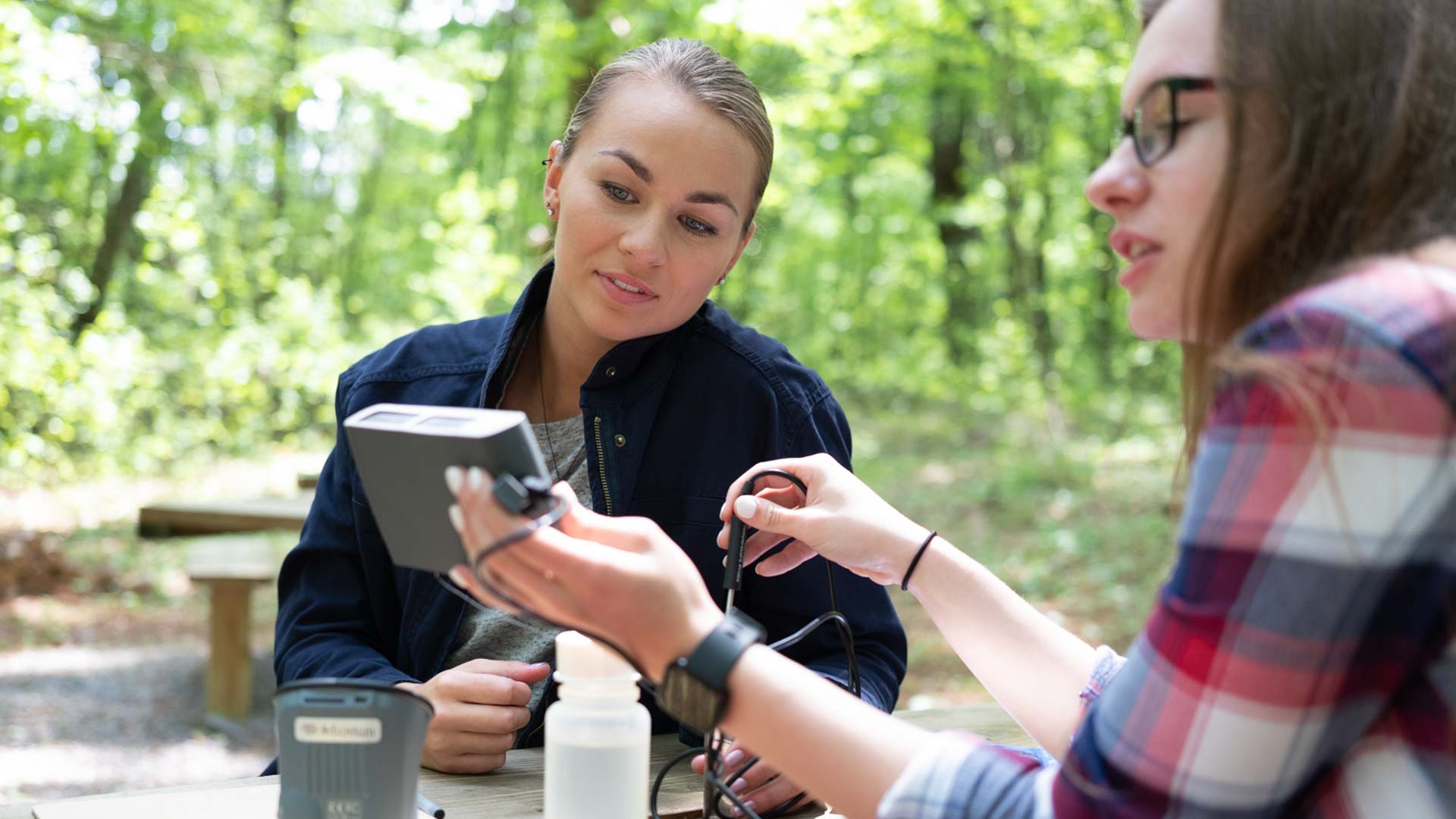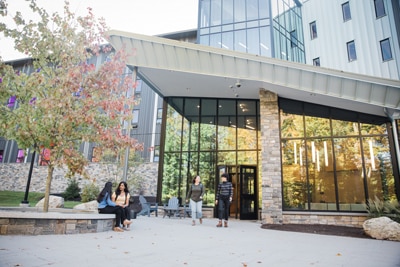Bachelor of Science in Environmental Science New England campus experience

Program Overview Why get an environmental science degree on campus?
Learn how to think and act critically and creatively to tackle important environmental challenges with a Bachelor of Science (BS) in Environmental Science from Southern New Hampshire University. In this program, you'll examine today's most vital environmental topics, including climate change, alternative energy, sustainability and the loss of biodiversity.
Skills you'll learn:
- Effective communication strategies
- Analysis of the intersections of humans and nature
- Practical problem solving
- Environmental science ethics
- Technological and field-based methods
- Quantitative and qualitative research

Courses & Curriculum Protect the planet with on-campus environmental science courses
Passionate about the natural world, including wildlife, natural resources, energy and climate change? In the on-campus environmental science program at SNHU, you'll build a strong foundation in natural and physical sciences while participating in hands-on environmental science opportunities like internships, citizen science, lab work and fieldwork. From utilizing geographic information systems to conducting environmental impact assessments and studying animal behavior, you can do what excites you.
Interested in learning in an online environment? This same curriculum is offered through SNHU's online environmental science degree.
Campus environmental science degree concentrations
With 30 free elective credits and the choice between 12 major electives or a concentration, you can tailor your program to fit your interests.
Understand the role wildlife plays in a stable environment and ecosystem, as well as the important role that humans play in conservation, when you get your Bachelor of Science in Environmental Science with a concentration in Wildlife and Conservation Biology at SNHU. This concentration will provide you with a specific, specialized understanding of the many ways animals influence the world around them, while underlining the importance of conservation.
With courses in ornithology, zoology, botany, animal behavior and conservation biology, you'll have the opportunity to gain a well-rounded understanding of the field or focus on the aspects of the concentration that interest you.
Courses may include:
- Field Ornithology
- Zoology
- Introductory Botany
- Animal Behavior
- Conservation Biology
Learn from instructors with industry experience
Our faculty members bring with them decades of knowledge and experience, which informs the development of SNHU’s courses and curriculum. They look forward to supporting your journey both in the classroom and as you work toward a career in your field.
Michele Goldsmith
Position
Full Professor | Coordinator, Environmental Science
Joined SNHU
2008
Education
- PhD in Biological Anthropology from Stony Brook University
- MA in Biological Anthropology from Stony Brook University
- MS in Animal Behavior from Bucknell University
Dr. Goldsmith is an associate professor of science at SNHU. Prior to her current position, she was the scientist-in-residence at Emerson College, assistant professor at Tufts School of Veterinary Medicine, and the McKennan Postdoctoral Fellow at Dartmouth College.
As a Fulbright Scholar and National Geographic researcher, Goldsmith studied lowland gorillas in the Congo and the impacts and ethical implications of mountain gorilla tourism in Uganda. She is on the board of the Great Ape World Heritage Species Project and Conservation New Hampshire, and is a published author. Although primates are her focus, she is interested in conservation and ethical issues surrounding all wild and captive animals.
Hamed Majidzadeh
Position
Associate Professor, Environmental Science
Joined SNHU
2019
Education
- PhD in Biogeochemistry from Auburn
- MS in Environmental Chemistry from Tehran Azad University in Iran
- BS in Applied Chemistry from Zanjan University in Iran
Before joining SNHU in 2019, Dr. Majidzadeh served as a coastal environmental quality program specialist for the South Carolina Sea Grant Consortium. He has also served as a post-doctoral research associate at Clemson University, as well as a research assistant at Clemson and Auburn University.
To learn more about SNHU faculty, visit our campus faculty page.
Campus major courses
You’ll take major courses that provide you with a solid foundation in your area of study – in some cases featuring experiential or project-based learning opportunities, labs, simulations and internships. These courses will allow you to learn a wide variety of topics and help prepare you for a role in your desired field.
Courses may include:
Visit the course catalog to view the full BS in Environmental Science curriculum.
Campus general education courses
All undergraduate students are required to take general education courses, which are part of SNHU's newly redesigned program, The Commons. The goal of The Commons' curriculum is to empower you with some of the most in-demand skills, so you can succeed not only in your academic career, but in your personal and professional life too.
Courses may include:
Can’t wait? You don’t have to!
Apply now if you’re ready, and have your decision within 30 days. Or, schedule a visit and come see us in person!
Have questions? Visit our Contact Us page.
Career Outlook What can I do with an environmental science degree?
Whether it's the field, lab or government building floor, a degree in environmental science can take you places. As an environmental science graduate, you can seek a multitude of careers in wildlife ecology and conservation, climate science, restoration ecology, natural resource management, park and forest management, land and nature preservation and environmental ethics and activism.
Best of all? With free electives and hands-on learning opportunities at your disposal, you can graduate with real-world experience that demonstrates your unique value to potential employers.
Career paths include:
- Aquatic ecologist
- Environmental scientist
- GIS technician
- Forest ranger
- Wetland scientist
Increase in roles for environmental scientists and specialists through 2033, projected by the U.S. Bureau of Labor Statistics (BLS).1
Median annual pay nationally for environmental scientists and specialists as of May 2023, according to the BLS.1 Statistic not based on wage data for SNHU graduates.
Understanding the numbers
When reviewing job growth and salary information, it’s important to remember that actual numbers can vary due to many different factors—like years of experience in the role, industry of employment, geographic location, worker skill and economic conditions. Cited projections are based on Bureau of Labor Statistics data, not on SNHU graduate outcomes, and do not guarantee actual salary or job growth.

Campus Student Experience So, what's it like taking classes on campus?
From conducting research in the on-campus arboretum to studying local deforestation, you’ll find yourself doing hands-on labs and projects that put your knowledge into practice. And since real-world experience is an integral part of the environmental science degree at SNHU, you could intern with organizations like the Maine Gulf Research Center or the New Hampshire Department of Environmental Services. Our faculty members are here to help facilitate those connections.

Student support
At SNHU, you don’t have to do this college thing alone. You’ll have help from your advisor, access to tutoring and office hours, career coaching, and mental health services so you can do your best and feel your best.
Additionally, our Office of Diversity and Campus Accessibility Center make campus a safe place for everyone. Visit our Student Services page to learn more about our support offerings.

Small class sizes
With an average class size of 15-25 (depending on your major) you’ll learn in an environment where professors with real world experience know you by name.
Here, you’re not getting lost in giant lecture halls, but instead, actively participating in thoughtful dialogue where you’re always encouraged to collaborate with your peers and ask questions when they arise.

State-of-the-art facilities
Our 300-acre campus has everything you need. From technology-advanced classroom settings to your dorms complete with fitness centers and hangout spots, our goal is to give you the best college experience possible.
Whether you’re learning in a classroom, in a lab, on the field, or in your field, you’ll have what you need to be successful from the moment you wake up to the moment you close your textbooks.
School of Arts, Sciences and Education Learn about the School of Arts, Sciences and Education
From understanding why people behave the way they do, to studying and tackling today's environmental issues, the School of Arts, Sciences and Education serves as an academic hub for creativity, collaboration and learning. Here, you'll have the chance to gain real-world experience through internships, student teaching, lab work and community-based projects. From studying cells under a microscope or analyzing crime scenes to leading a student-teaching session in an elementary classroom, you’ll learn how the world works so you can help make it a better place.
Student teaching opportunities
Inkwell game design studio
State-of-the-art labs
How SNHU makes college affordable
At Southern New Hampshire University, we're on a mission to make high-quality education more accessible with more affordable tuition. With 70+ career-focused majors, state-of-the-art facilities, D2 sports and over 70 student clubs and organizations, you can get the campus experience you've always dreamed of at a more affordable price.
Fill out the FAFSA to see if you’re eligible for grants or work-study. (You could also be offered loans, though you’ll have to pay those back later.)
Transfer up to 90 credits toward your bachelor's degree program at SNHU. If you’ve taken one course or many, we’ll evaluate them for you.
Getting free money for college – from SNHU or an outside organization – could help you save hundreds or even thousands of dollars.
Our collaborative partnerships with high schools enhance academic opportunities and college accessibility for some high school students.
Hear from us

Students in our program learn about the natural world and how humans impact it so they can invoke change within themselves, in their community and across the nation.
Michele Goldsmith, Full Professor, Coordinator (Environmental Science)
Accreditations
SNHU is accredited by the regional accreditor the New England Commission of Higher Education (NECHE). The university also carries specialized accreditations for some programs.

Sources & Citations
1Bureau of Labor Statistics, U.S. Department of Labor, Occupational Outlook Handbook, on the internet, at https://www.bls.gov/ooh/life-physical-and-social-science/environmental-scientists-and-specialists.htm (viewed Oct. 8, 2024).
Cited projections may not reflect local and/or short-term economic or job conditions and do not guarantee actual job growth.
Your dream school is waiting
Apply now or schedule a visit today.


